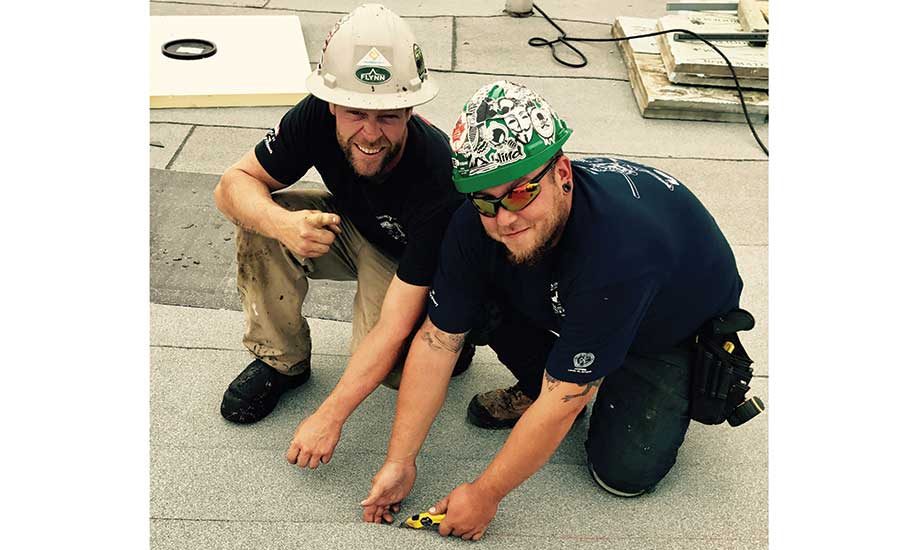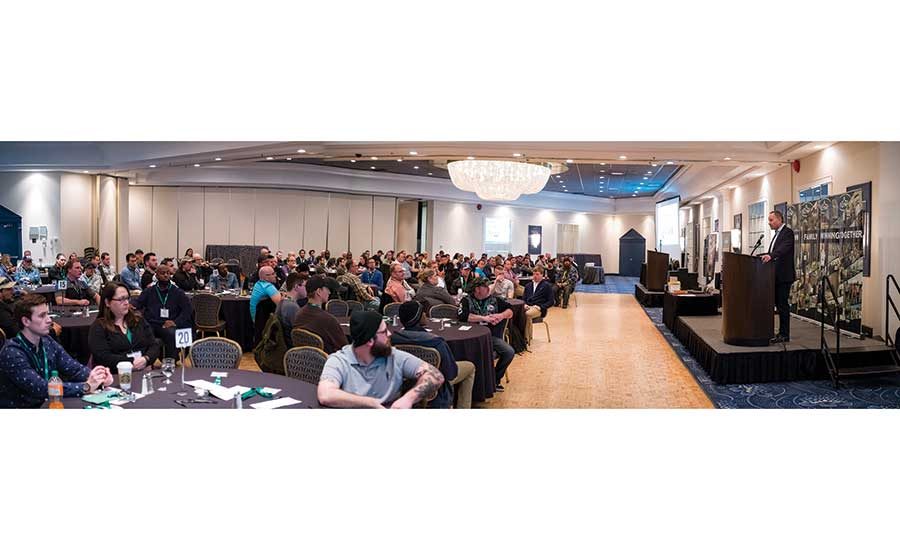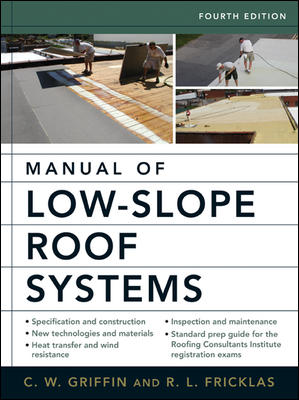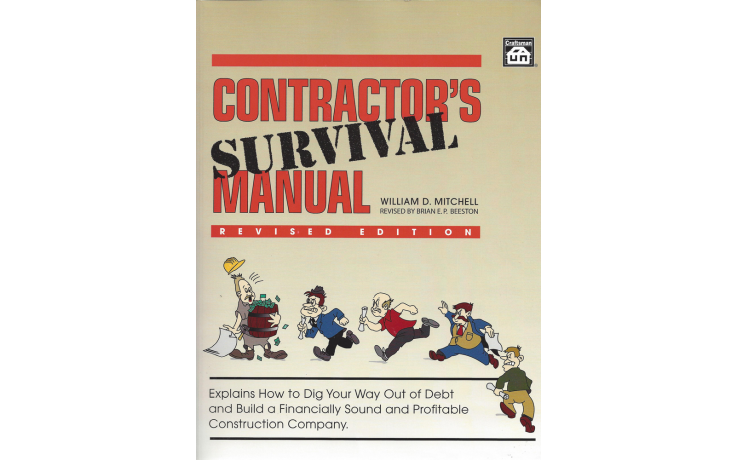Flynn Group of Cos.: Northern Exposure
After Four Decades of Dominance North of the Border, Flynn Group Takes Aim at the Commercial Roofing Market in the United States

Flynn Group believes in making worker safety a priority and promoting people from within. “If you take care of your people, the profits just tend to take care of themselves. It’s just true,” said President and CEO Doug Flynn.

President and CEO Doug Flynn (far right) addresses some of the company’s 5,500 employees during one of Flynn Group’s annual Safety Day meetings earlier this year.

Flynn Group of Cos. is headquartered in its native Canada, but has grown quickly with 12 locations in the United States that generated roughly $265 million in revenue in 2017. Photos courtesy of Flynn Group.



Despite recent ripples in the political and trade partnerships between the United States and Canada, there’s still a wealth of business opportunities, many roofs to install and plenty of profits to reap as a roofing contractor working on both sides of the border.
There just aren’t too many roofing companies that can do it, much less as consistently and successfully as the Flynn Group of Cos. Founded in 1978 with fewer than 10 employees by Don Flynn, the company grew to become one of the major roofing and cladding contractors in the region within its first decade. During the 1990s came a period of expansion, highlighted by the acquisition of the Peerless Group in southern Ontario, Canada. By the time corporate headquarters was relocated to Toronto in 2005, Flynn was the leading total building envelope contractor in Canada, and had its sights set on expansion into new fruitful roofing markets across the continent.
Current President and CEO Doug Flynn, Don’s son, began his career in roofing in 1982 working in the field. He specialized in roofing tools and advanced through the organization participating in all aspects along the way. He took over company operations in 1991 and helped navigate the company’s growth into a juggernaut. Last year, Flynn surpassed $700 million (U.S.) in sales between 35 locations across both countries and now employs more than 5,500 people. The workforce is a mix of union and non-union employees dedicated solely to commercial roofing projects. Each branch is a local business supported by centralized shared services such as accounting, marketing, and human resources.
Looking South
As the company continued to dominate the commercial roofing market in Canada, Flynn had long looked at the roofing market in the U.S. as fertile territory for expansion. Despite major players with comparable balance sheets already active and in growth mode, Flynn was confident in his company’s culture as a difference maker.
“Since we had nowhere else to grow in Canada, we’ve had a very good view of the market in the U.S. through suppliers and people we know in the industry,” Doug Flynn said. “And I always knew it wasn’t really all that different, aside from the weather patterns and the color of the money.”
The company flirted with the idea of partnering with American roofing contractors before, but instead stayed close to home, and learned some valuable lessons watching from afar.
“We became aware that for one reason or another, the national rollups led by private equity groups didn’t work,” Flynn explained. “They all approached us, and we said ‘no.'”
He and the company’s executive leadership developed a long-term strategy for extending the company’s reach across North America. The variable was timing — which he also knew had to be right.
“Getting involved then … it just wasn’t the right time and the lessons learned were that this is an owner/manager type of business,” Flynn said. “One that’s not really conducive to being public or owned by bankers. It’s too relationship-based and it just doesn’t work.”
Flynn said expanding south was a gamble, but he also knew the principles of success were the same, regardless of which side of the border a fertile roofing market stood.
“You’ve got to get good work in the door; got to get ‘er done, safely; take care of your people and your customers; and then make a profit,” he said.
Part of the strategy was crossing the border with one advertisement for acquisition, which Flynn said they’ll never have to repeat because of an avalanche of interest. He said they were fortunate to be in a position to be picky. They knew they could only sustain a certain level of growth and chose opportunities that would begin to pay dividends relatively quickly.
Since 2014 Flynn’s made eight acquisitions in the U.S. and reported generating more than $265 million in American operations in 2017, good for No. 3 on RC’s 2018 Top 100 Roofing Contractors List. That’s a notable jump from the $161 million generated in U.S. operations in 2016, which ranked No. 5 on RC’s 2017 list.
“We prefer to keep things low-key, but we’ve gotten so much traction in the U.S. and great interest. I can see that our future in the U.S. is very bright,” Flynn said.
“We think we’re a very good option for roofing businesses without many succession options, or owners of businesses that want to grow but need a partner with a balance sheet in order to do that.”
Big Moves
In each of the past three years, Flynn has made significant acquisitions of roofing contracting businesses with strong reputations and committed client bases in critical U.S. markets.
In March, Flynn announced a merger agreement with Cobra BEC Inc., which has offices in Spokane, Seattle, Portland, Boise and Dallas.
The company is still operated by brothers Travis and Eric Dix, who aggressively grew their multi-generational family roofing business and drew Flynn’s attention. Both are expected to be key parts of the company’s overall strategic growth in the Pacific Northwest, and are finding the partnership mutually beneficial to their employees.
“We think that by combining our teams of people, we are perfectly positioned to take advantage of growth opportunities in the region,” Travis Dix said. “Providing advancement for our people is particularly important to us; teaming up with Flynn offers our employees opportunity we could not otherwise provide.”
That was the first major acquisition of the year, following a busy 2017 in which they established themselves firmly in the bustling Dallas-Ft. Worth roofing market by acquiring BRI Commercial Roofing. Both of BRI’s founders stayed on in primary leadership roles while becoming Flynn shareholders.
In 2016, Flynn acquired and consolidated D&D Roofing Inc. and D&D Monarch Sheet Metal Inc. in Colorado to become Flynn Southwest.
Flynn said that as a large contractor in acquisition mode, the company easily has about 20 non-disclosure agreements with firms they’re looking to partner with. It’s a part of the job he now thrives on.
“We get to look at a lot of different companies and I love doing that,” Flynn said. “I get involved in all acquisitions personally. It’s great when you can look under the hood of another company because two things quickly become evident: You become aware of what you’re good at; and even quicker, you become aware of what you thought you were good at.
“Every one of them is an opportunity to learn and see if there’s a better way of doing things and I find that pretty exciting.”
Safety … Always
Balancing safety requirements in one country with regulators that are subject to changing political policies and priorities can be a challenge for any roofing company. Try doing it in two countries. Flynn maintains a strong safety record in both the U.S. and Canada despite the challenges of working in two different bureaucratic systems. They do it not just because it leads to greater profitability, but because it’s simply the right thing to do, Flynn said.
“Safety is our top strategic priority because we believe it’s the right thing to do — for our people, our business, and our clients,” he said. “We don’t do all the things we do when it comes to safety because the government sets standards that we must follow. We do them because we truly care about our people, other trades on our sites, and the public.”
Flynn’s organizational structure includes a dedicated health and safety team comprised of two directors and more than 30 managers and specialists that focus solely on safety-related tasks. The team created an evolving, comprehensive safety program that reinforces best practices, provides regular training and educational opportunities, and ensures crews are in compliance once on the jobsite.
The safety professionals act as coaches and lend support to crews in the field, but also convey the importance of safety as a company culture — one that each team member is responsible for contributing to.
“Our safety culture is successful because people at every level of the organization lead through example,” he said. “We believe this is the way we will continue to develop and strengthen our thriving safety culture.”
The specific focus on safety organically lead to a new, informal company motto: “At the end of the day, we all go home safe,” Flynn said. It also hasn’t gone unnoticed internally or externally.
Years ago, the company established its own series of safety awards issued companywide on an annual basis. They include the Don Flynn Safety Award — named after the company’s founder — that highlights the two branches with the top health and safety performances over the past 12 months. The company rewards employees at those locations with a celebration and a trophy that’s prominently displayed in their offices. Individuals and crews at the branch level are also recognized for outstanding safety records each month, and are also eligible for the Flynn Safety Innovation Award, which recognizes those who introduced an innovative process or technique that promotes health and safety.
Flynn also has a knack for acknowledging employees that go above and beyond to help others in life-threatening situations when they’re off duty in the community. The annual Lifesaver Award is given to Flynn employees who have used their safety training to help save a life.
In 2016, Sarah Kasper, safety director for U.S. operations, used her skills and training to help save the life of a 13-year-old boy struck by a baseball during a tournament in Westfield, Ind. Later that year, Nate Wyman, of the Kansas City branch, found an unconscious man with no pulse and performed CPR until first responders arrived — literally saving his the man’s life.
Other recent safety-related achievements from Flynn branches include:
The Calgary branch recently achieved over 1.2 million hours without a lost-time injury.
Last October, the Regina branch celebrated five years of no lost-time injuries, and subsequently also reached the 1 million hours mark without a lost-time injury.
Last July, the Prairies Region (Manitoba and Saskatchewan) celebrated three years of no lost-time incidents.
Government officials recently recognized Flynn for 5 million hours without a lost time-incident on the Humber River Hospital Project in Toronto.
Secret Weapon
As much success as Flynn has experienced as a company, its current leader said he understands that it’s only because of the people involved in the organization — from the top down. Like its safety program, Flynn’s organizational structure values communication, authenticity and transparency. Company leaders are also held accountable for complying with high company standards when it comes to safety and doing things the “Flynn Way:” a collection of behaviors and actions influenced by collective values and beliefs. They’re also required to put their names to it in a public display for all employees to see.
“Consistent leadership is paramount to ensuring our continued success. The Flynn Leadership promise captures the values and behaviors that we believe need to be exhibited by our leaders on a daily basis,” Flynn said. “By signing a personal copy and hanging it in their offices, our leaders commit to deliver on the promise every day.”
Like Flynn, many in top leadership positions have been promoted from within after working their way up from journeymen and foremen to branch managers and eventually vice presidents.
He said he believes that helps prevent turnover, as does the philosophy to stay an integrated operation that thinks and acts like one company, despite its large geographic footprint.
In addition to safety and a robust benefits package, employees also appreciate the company’s emphasis on high-quality installations and customer service, Flynn believes.
It starts with technical training administered through “Flynn University,” a series of training workshops that address the fundamental components of the business, the company’s value chain, and how to stay connected with leaders at all levels. Current programs are designed to target front-line leaders, promising millennials, candidates for management, customer-facing service technicians, project managers and field crew coaches.
Officials said that more than 2,300 employees have completed the sessions since 2012.
“Flynn University is a major investment, but is transformational when it comes to our people, with long-term value for both the company and the people being developed,” Flynn said.
When it comes to workmanship, company leaders realized that each Flynn location developed their own best practices based on a wealth of knowledge built up over the years. Rather than leave that resource pool untapped and isolated to their respective branch locations, the company created the Operational Excellence Team (OPEX). The group is comprised of employees from across the company to identify and implement best practices across all building disciplines. At the same time, the members look for continuous improvement, traveling from branch to branch collecting and sharing the information. Upon request, this group is also made available to consult on individual projects to provide input on specific challenges.
Put it all together, and Flynn said it shouldn’t be a surprise that the company continues to thrive after starting an owner-equity program nearly 20 years ago.
“We knew the best owners for this business were running our business, so we made equity available to keep people along our journey and we’ve just found it’s been a secret weapon for us,” Flynn explained. “If you take care of your people, the profits just tend to take care of themselves. It’s just true.”
Looking for a reprint of this article?
From high-res PDFs to custom plaques, order your copy today!











